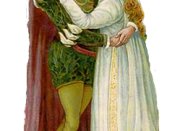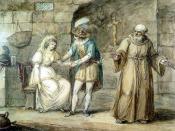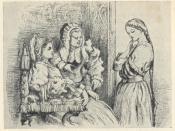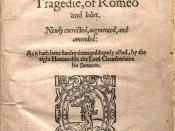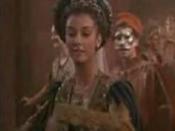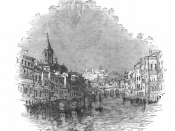Maturity "For never was a story of more woe than this of Juliet and her Romeo"� " Romeo and Juliet,"� is a play written by William Shakespeare, and is known for the extensive use of intricate Elizabethan language, and imagery. The story is about a pair of "star-crossed lovers"� who fall in love but unfortunately the everlasting feud between their families cost them their lives. One of the main characters, Romeo, a young adventurous is portrayed as a dynamic character that changes significantly through the course of the play from an immature boy to a mature man.
In the beginning of the play Romeo is illustrated as a young, fragile, lovesick boy, who does not know true love. During the start of the story Romeo is portrayed as a lonely boy who thinks he is in love with a girl named Rosaline. Although he has a strong belief of being in love with Rosaline, he says, "This love I feel, that no love in this,"� (Pg.16
Line 175) portraying his misunderstanding of the concept of love. Shakespeare also illustrates Romeo's untrue love with dark imagery; " feather of lead, bright smoke, cold fire, sick health,"� (Pg. 16 Line 173). Romeo is a lovesick boy, which is depicted in the line, "In sadness cousin, I do love a women,"� (Pg. 17 Line 197) He states that this love has made him sad, whereas love is supposed to make one happy. Later on in the play Romeo encounters an invitation, which states that Rosaline, is invited to this party. Benvolio in a way, thinks that Romeo is not truly in love, therefore pushing him to attend this party to "compare her face with some that I shall show (Pg. 27 Line 88) telling Romeo to find a girl even better than Rosaline. In response Romeo says, " Ne'er saw her match since first the world begun,"� (Pg. 27 Line 95). Without going to the party he has already come to a conclusion that there is not better than Rosaline, hence depicting his immaturity because it is a childish response. Romeo still goes to the party but for another reason; to meet Rosaline. The moment Romeo takes a glance at Juliet, he says, "O she doth teach the torches to burn bright,"� (Pg. 46 Line 43). The meeting of Romeo and Juliet is a very important aspect of the play, and Shakespeare shows that by making their first conversation an Elizabethan sonnet. In a moment, he changes his love from Rosaline, whom he has been lovesick over, to Juliet who he has not even spoken to. The love for Juliet is more of a true love, as Shakespeare illustrates through the use of light imagery pervading Romeo's initial response to Juliet.
As Romeo approaches maturity, his passionate side still remains a dominant force. After the party Romeo and Juliet meet once again under her balcony, where they speak to each other. Although Romeo has started to mature his passion is still in control for while he is in the garden of Juliet, and even though he knows that he will be killed if he is found, he merely says, "I have night's cloak to hide me from their eyes, " (Pg. 64 Line 117). This quote conveys that he is too much in love to care about his own well being which is a sign of immaturity. Because Romeo is so deeply in love with Juliet before leaving the balcony he jumps to a conclusion and says, " Th' exchange of thy love's faithful vow for mine,"� (Pg. 67 Line 169) asking Juliet for her hand in marriage. Romeo later confronts Friar Lawrence about this happening, and when the Friar asked Romeo whether he is still in love with Rosaline, he says, "I have forgot that name, and that name's woe,"� thus illustrating his immaturity. Preceding this Romeo encounters some of the Capulet boys. Tybalt a Capulet boy starts to insult Romeo and his friends, but Romeo's reaction was to simply say, " but love thee better than thou can'st devise."� Romeo is telling Tybalt that he loves him for reasons beyond Tybalt, which depicts his maturity building, for instead of fighting back; Romeo gives in due to his love for Juliet. Shakespeare shows that Romeo continues to mature when Tybalt, starts a fight with Romeo's best friend Mercutio, and Romeo comes in between this fight to try stop it but while Romeo is telling them to stop, Tybalt thrusts his knife into Mercutio. This depicts Romeo's maturity and immaturity, because for Romeo to stop this fight was a mature action, but to act without thinking the action through is an immature doing, and it is what gets Mercutio killed. Before his death Mercutio says, " Why the devil came you between us. I was hurt under your arms,"� (Pg. 109 line 99), and this is when Romeo realizes that due to his immature action his friend was slain. Romeo then makes his mind to revenge Mercutio's death by killing Tybalt, and this depicts his immaturity because without thinking of the consequences that he would have to face he followed his instinct and took his revenge. This scene where Romeo is furious with Tybalt, is a major contrast to the beginning of the play where he was a fragile, innocent young boy.
Near the end of the play Romeo matures into a man and learns to make his own decisions. Romeo and Juliet soon after Tybalt's, and Mercutio's deaths have a honeymoon in the room of Juliet. Romeo's attitude towards this has changed greatly for, during the balcony scene Romeo did not care about getting caught, instead only about love. The morning after the honeymoon, Juliet persists Romeo to stay, but Romeo says,"� come death and welcome!"� (Pg. 139 Line 24.) Therefore, showing that he cares about getting caught and he prioritizes his safety above staying longer with Juliet, hence emphasizing Romeo's maturity. Shakespeare uses this scene to shown the dynamic changed that has taken place in Romeo's attitude towards life and his maturity. The next event that takes place is Juliet's false death that Romeo is not notified about. In this Shakespeare uses a letter that does not reach Romeo to foreshadow the death of the couple. Romeo again prioritizes Juliet at the top, for the instant he hears about her death, he decides to drink a poison that will let kill him, so he can be with her. Even though Romeo does not appreciate Paris, he knows that he also loves Juliet, so after Paris dies, Romeo says, "In faith I will. Let me pursue this face,"� (Pg. 191 Line 74) In this he is stating that he will lay Paris's body next to Juliet's, hence showing his maturity. He also realizes that his life would be like an "artificial night"� (miserable) without Juliet so he drinks the potion; "Here is to my love!"� Thus showing his attitude towards, life, where he puts his love for Juliet above anything else.
In conclusion Romeo is a very dynamic character, as he starts of as a love sick, immature boy, and turns into a bold, mature man, which he did as he faced new experiences and made important decisions. I feel that Shakespeare has written this play very well, for the imagery and language that he has used, has emphasized Romeo as an ever-changing character.
